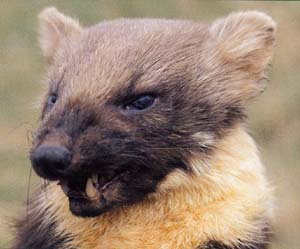... and next
The next stage is to set up projects to study species in decline and I have applied for funds for work on:
a) stoats and weasels; b) barn owls and kestrels; c) bats. If these applications are successful, the specimens currently held in deep freeze will be examined and others sought.
Funding for the Wildlife VIC running costs is minimal at present and I am most grateful to Heligan Gardens/ the Pennon Group, Restronguet Creek Society and several individuals for their support.
Now - it's your body I want!
For the various projects to be successful it is important that:
• Wildlife casualties are reported quickly. Please call me on
(01872) 560623 or the Trust on
(01872) 273939.
• Specimens must be examined whilst they are fresh. We therefore need a network of volunteers who would be prepared to deliver small bodies from their areas. If you travel regularly to Truro, would you be prepared to go on a list of couriers? We are calling this "Bodyline". Bodies could be dropped off at the Wildlife VIC, Chacewater, or the Trust at Allet.
Will you help?
Vic Simpson
All are welcome to Vic's Open Day at the VIC, from 10.00am to 5.00pm on Saturday 6th July.

Pine marten - one of the more unusual specimens received by Vic,who operates the only Wildlife Veterinary Investigation Centre in Britain.
Photo: Vic Simpson
Congratulations
Vic Simpson's work as a wildlife pathologist has long been appreciated by the Trust's Otter Group, which brought him road casualties for post-mortem during the 1980s and 90s. Chemical analysis of the otters reinforced the case for banning certain pesticides, like dieldrin, as well as making people aware of the scale of road casualties. Some will know of Vic's work on swan deaths in the 70s. This resulted in the banning of anglers' lead shot, saving thousands of swans every year. Others will know of his research on stranded cetaceans, which provided essential information to identify causes of death; typically 80% of dolphin strandings show the characteristic signs of death in a trawl.
These achievements were recognised nationally at the BBC Animal Awards last December. Many will have seen this on television and wish to congratulate him, feeling as I do that it is so well deserved. Vie has applied his skills as a veterinary pathologist to help solve the various man-made problems for wildlife. For those concerned at losses due to pollution, road traffic or as the by-catch of trawlers, action to protect wildlife depends crucially on the evidence from post-mortem examinations.
Such examples are typical of Vic's career spanning 30 years with MAFF. Now, during his so-called retirement. Vie plans to continue working in his recently launched Wildlife Veterinary Investigation Centre (see Wild Cornwall spring 2002). This is a unique initiative in the UK that will continue to build his internationally important database.
Vic's plans depend largely on you. He needs your help in supplying wildlife casualties, volunteers to assist in his work, people to transport bodies to the centre - and, of course, funding!
Tony Stebbing Trust President

Vie Simpson is presented with
the Veterinary Award
at the inaugural BBC
Animal Awards by renowned medical
expert Professor Robert Winston.
Photo by courtesy of the BBC